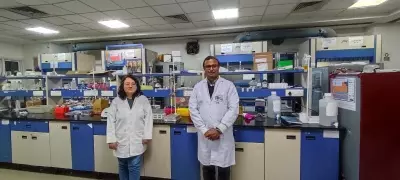
IIT researchers use orange-peel for making biofuel precursors
text_fieldsResearchers from the Indian Institute of Technology Mandi have used hydrochar derived from orange peels as a catalyst to convert biomass derived chemicals into biofuel precursors.
The research will help to develop biomass-based fuel to overcome the socio-political instabilities associated with dwindling petroleum reserves.
This method will help in producing clean green power from biomass and hasten India's journey towards sustainable fuel development, free from the shackles of fossil fuel dependence.
The findings of the research team have been recently published in the journal 'Green Chemistry'. The research was led by Dr Venkata Krishnan, Associate Professor of School of Basic Sciences at IIT Mandi, and co-authored by his students Tripti Chhabra and Prachi Dwivedi, a release from IIT Mandi said on Wednesday.
Biomass derived products from naturally occurring materials, is currently the fourth most significant energy source that can meet the energy demand after coal, oil, and natural gas, in the country.
Lignocellulosic biomass obtained from forestry and agricultural waste, for example, can potentially be converted to a variety of useful chemicals by various methods.
Of these methods, the use of catalysts for the conversion is particularly useful because such processes can be carried out with minimal energy input and the type of product obtained from the biomass can be controlled through the right choice of catalysts and reaction conditions.
Talking about the research, Dr Venkata Krishnan said: "One of the driving interests among the renewable energy community is the development of relatively clean and energy efficient processes to convert biomass into useful chemicals, including fuel."
The simplest and most low-cost catalyst that has been studied by the researchers for biomass conversion reactions is hydrochar. It is typically obtained by heating the biomass waste (orange peels in this case) in the presence of water through the hydrothermal carbonisation process. The use of hydrochar as a catalyst for biomass conversion is attractive because it is renewable and its chemical and physical structure can be altered for better catalytic efficiencies, the release said.
The researchers have used hydrochar derived from orange peels to catalyse the conversion of biomass-derived chemicals into biofuel precursors. They heat dried orange peel powder with citric acid under pressure in a hydrothermal reactor (a lab-level 'pressure cooker') for many hours. The hydrochar that was produced was then treated with other chemicals to introduce acidic sulfonic, phosphate and nitrate functional groups to it.
"We used these three types of catalyst to bring about hydroxyalkylation alkylation (HAA) reactions between 2-methylfuran and furfural, compounds that are derived from lignocellulose, to produce fuel precursors," explained Chhabra.
The scientists found that the sulfonic functionalised hydrochar catalyst was able to catalyse this reaction effectively, to produce biofuel precursors in good yield.
Further, Krishnan added: "We were able to synthesise the biofuel precursors under solventless and low temperature conditions, which decreases the overall cost of the process and also makes it environment-friendly, attractive from an industry point of view."
This is the first comparative study in which the three types of acid functionalisation have been assessed. They also performed green metric calculations and temperature programmed desorption (TPD) studies to gain deeper insights into the catalytic activity of sulfonic, nitrate and phosphate functionalised hydrochar derived from orange peels, the release added.






















